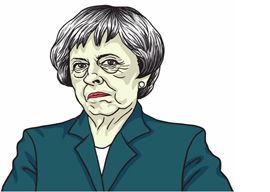
February 06, 2018

Source: Bigstock
At the center of this circus is the crusty “1922 Committee,” which represents backbench Tory MPs. Letters of no-confidence in the party leader are sent to its chairman, who—in a Harry Potter touch—keeps them in a safe behind his desk. The magic number to trigger a no-confidence vote is 48. No one knows how many of these letters have been sent and by whom. There is the unspoken sense that—even as they undermine her—no one among her colleagues really wants to accept the cup of the British premiership and risk being responsible for an election loss to Corbyn. The most intellectually capable candidate to succeed Theresa May would be Michael Gove, although he remains a political outlier (think Ted Cruz without the boots). Yet a leadership contest itself could cause the government to fall—clearing the way for Red Jeremy.
The result is a premier who is being kept upright by her own weakness. As such, Theresa May’s position has more echoes of 1871 than simply the internecine collapse of the defeated French. Both the Austrian and Ottoman Empires had passed the point of sustainability but could not be allowed to collapse for fear of what would come after them. Their last card was a borrowed warning, whispered into the ears of their hungry allies: “Après moi, le déluge.” And yet history shows us that the longer they staved off the deluge, the more catastrophic it was when it arrived. The Tories should take note. British people are known to be tired of elections and leadership contests. But they will be a lot more tired trapped between the prongs of Jeremy Corbyn’s state capture and the endless twilight of a contested Brexit. The Tory party must allow for an alternative vision to emerge from its ranks—and fast.